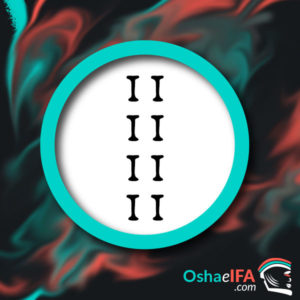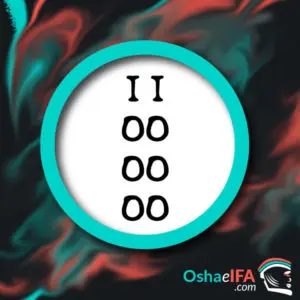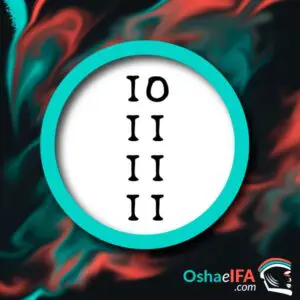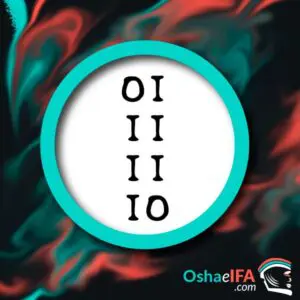Oshe Nilogbe (Òsé Ogbè)

Oshe Nilogbe (Òsé Ogbè), Odu number 227 in the Lordly Order of Ifá, highlights how emotional temptations can cause temporary disorders. This sign emphasizes the importance of maintaining stability and emotional balance. Furthermore, if this Odu is revealed during a consultation, it is recommended not to give any religious power or initiate the consultant in Ifá, since Orunmila warns that this person will betray him.
Analysis and Interpretation of the sign Oshe Nilogbe (Oshe Ogbe)
Oshe Nilogbe, a fundamental Odu in the Ifá system, is closely linked to clairvoyance and spiritual protection. This sign embodies purification and spiritual awakening, frequently highlighting the need for both physical and spiritual cleansing to prevent or resolve both internal and external conflicts.
This Odu reveals abilities such as spiritual transportation and clairvoyance, highlighting a deep connection with the metaphysical. In addition, it emphasizes the need to be prepared, since we can be victims of surveillance or espionage by our enemies. The importance of worshiping the guardian angel or the tutelary orisha is also highlighted, reinforcing the idea that with his blessing any adversity can be avoided.
Economic Aspects
In economic terms, Oshe Nilogbe emphasizes the need for caution to avoid greed and impulsive decisions. This Odu highlights the importance of integrity and honesty in financial transactions, warning about the risks of associating with malicious people and engaging in fraudulent activities that can lead to legal consequences or serious financial losses. Furthermore, he warns that previous sufferings can be replaced by prosperity, underscoring the wisdom of facing difficulties in the beginning to prosper in the end, as taught by Orunmila.
"Salud"
This sign focuses on preventing illnesses caused by spiritual and emotional imbalances. Cleansing practices and rituals are vital to maintaining physical and spiritual well-being. This Odu also highlights specific conditions such as amnesia and catalepsy, suggesting that mental health and memory may be areas of concern for those influenced by this sign.
Religious Aspects:
In the religious sphere, Òshé Ogbè highlights the vital importance of making sacrifices and offerings, particularly to divinities such as Oshosi and Elegua. These rituals not only seek protection but also strengthen the spiritual connection of the practitioner. Adherence and respect for rituals are essential to preserve spiritual balance and harmony. In addition, this Odu urges constant cleaning, warning about the presence of witchcraft, sorcery and curses that could affect both people and their homes. Ifa warns that these attacks may come from paleros or individuals who work with Jewish Garments (Ndokis), underscoring the need for constant vigilance and protection in spiritual practice.
Personal relationships:
In the area of personal relationships, Oshe Nilogbe portends significant challenges, especially in the context of family and love. This Odu highlights the presence of betrayals and emotional trials, urging those ruled by him to focus on clarity and honesty in their interactions. The importance of understanding and forgiveness is highlighted as keys to overcoming conflicts and strengthening emotional ties. It is associated with the saying "no one knows what they have until they lose it," which emphasizes the need to value and care not only for material goods but also for personal relationships, emphasizing the importance of not taking those around us for granted. .
General Description of the Odu Oshe Nilogbe
Names or Aliases:
- Oshe Ogbe.
- Oshe Nilogbe.
- Oshe Logbe.
- Oshe Nilogue.
- Oshomina.
- Òsé Ogbè.
What is born in the sign of Ifá Oshe Nilogbe?
- Clean your eyes with eggs.
- The cult of Oshósi and Aroní.
- Amnesia and catalepsy.
- The abnormal ones.
- The deaf-mutes.
- The spiritual faculty of transportation and clairvoyance.
- The snitches and snitches.
- The secret of ecstasy of the scalp.
- The Ndoki.
- The curse of Olófin to the town of Ketú.
- The secret of Oshósi (etubón), the gunpowder.
- The three arrows of Oshósi and their secret.
What is Oshe Nilogbe talking about?
- The flying witches speak.
- The son loved his mother very much and then despised her.
- They speak the lips as a pleasant part or kisses that are not forgotten.
- The one who saves the person is Obatalá.
- You cannot give Eleguá to anyone.
- Shangó is given unyén in the courtyard and left there for 4 days.
- It's where the knife tests everything first and cuts anyone.
- This is Salta Perico.
- Eyelé is given to the belly of the obiní to prevent the birth of a sick child.
- Eleguá fell into three traps.
- In the last quarter, the woman is in crisis because of the man.
- A well-made conspiracy is made.
- No one is accommodated in their home.
Oshe Ogbe (5-8) notes:
- They created the position of Agbombon.
- Black beans and organ meats are not eaten.
- Aroni is received.
- Speak the secret of Jagüey.
- The drum was played.
- Olofin doubted the fidelity of his wife.
- The herbs are: pajón grass and foxtail.
It may interest you: Ifa Iroso Umbo sign
Oshe Nilogbe Sayings:
- As long as his guardian angel does not abandon him, there is no king to stop him.
- In revenge is death.
- Neither money remains silent in any pocket, nor does damage in this life go unpunished.
- You can always do good to everyone who needs it, wherever you are.
- No one knows how much good they have until they lose it.
- To decide a trial, both sides must be heard.
- Be careful with a friend of the house who leaves a husband.
- Foolishness is bound in the heart of the boy, but the rod of correction will drive it away from him.
- The people will curse him who withholds the grain, but a blessing will be on the head of the one who sells it.
The saying "To decide a trial, you have to hear both sides" reminds us of the importance of impartiality and justice. It underscores the need to consider multiple perspectives before making decisions. Listening to both sides before judging ensures complete understanding and promotes fairness in all relationships.
Ifa ethical code of odu Oshe Nilogbe:
- The secrets of Ifa are not revealed.
Meaning of the oddun Oshe Nilogbe:
Oshe Nilogbe never lacks food because when he was asked what he wanted, he replied: "May I never lack food." That's how Olofi granted her request. This Ifá is associated with kings who rule; here, Oshún ruled over Obatalá and the drum was played. Furthermore, Elegua fell into three traps; He saved himself on the first two occasions, but on the third, it was Obatalá who rescued him.
This Odu speaks of flying witches and the war against the sorceress, palera or mayombera woman. The person ruled by this Odu of Ifá, Oshe Nilogbe, is not easily trusted nor should secrets of Ifá be revealed to him. If he is the sign of an Awó, he is considered malicious and with little faith in Orunmila.
Those ruled by this sign live many years, so long that they must eventually be taken out into the sun. There is a saying that goes: “Take care of yourself, and I will take care of you. As long as God forbid, no one can harm you.
These people usually have an internal melody. The Babalawos and Aleyos of Oshe Nilogbe can lose their sight. The presence of a fixed thought about another person and Oshún's dominance over Obatalá is mentioned. Additionally, heat or burning in the body is discussed and how the person can become numb when their head is touched, due to the secret of scalp ecstasy.
The carefree Obini with her person might get bored if she is alone, so it is recommended that she get married or form a marital union. The Okuni is described as talkative and disorderly in all aspects of life, which often leads to him being spoken ill of.
The person ruled by this Odu lives in a self-conscious manner and lacks self-control, without significant experiences in his life or joy in his heart.
You may also like: All about the Odu Oshe Meyi
Advice from Odu Oshe Nilogbe (Ogbe):
- Black hats or hats with black ribbons should not be worn.
- It is crucial to take extreme care of Eleguá.
- Do not perform favors without receiving compensation; Get paid for what you do.
- Hold a mass for a family eggun.
- You will receive the blessing of a family eggun, who will provide you with wisdom, good vision, and the blessing of your ancestors, including your deceased father.
- It should be bathed with poplar omiero and atiponlá, adding a fish to the preparation.
- The awo of this sign should not be taught much, or not at all, since he will not believe in ORUNMILA and could become his enemy.
- It is indicated that when the moon is in its waning quarter, the woman experiences a crisis with the man, feeling heat and flushing in her body.
- The leri (head) should be begged with a large snapper. Subsequently, it is filled with the ebbo and thrown into the sea. Osha will probably need to be done, possibly with Oshun.
Oshe Ogbe in Ire (wellness):
- An oath is sworn with an eggun to avenge or finish a task left unfinished.
- The oath has not been fulfilled, and the eggun is claiming a debt; As long as it is not resolved, well-being (ire) will not be achieved.
- In this Ifá, Oshe Nilogbe, opinions differ: some say one thing and others another.
- Due to boredom, the person has contemplated suicide.
- Money is reserved for the òsha for future uses.
- There are difficulties with documents and paperwork.
- A man discovers his wife with another man and expels her from the house.
- Through this Ifá, a person in office is accused and convicted of slander.
- The person who protects himself is the one who accuses another of being a thief, therefore, it is not recommended to provide shelter or do favors.
In Osobo (adversity):
- The Awó of this Odu must have Oshósi complete, offer him a rooster (akukó) every three years and play the Batá drum for him.
- A mother abandons her daughter because she was born with scabies, and the girl dies, taking her sister with her to Heaven so that she no longer suffers on Earth.
- A man kills his wife because he abandoned his daughter.
- People ruled by this Odu, Oshe Nilogbe, tend to be very greedy.
- A woman betrays her husband, but realizing that he knows, she desperately runs away from home.
- When a dog (Ayá) is offered to Oggún, the knife is painted on both sides: on one side Oshe Nilogbe and on the other Ogunda Tetura.
Says Ifa odu Oshe Nilogbe
The person was looking for advice to solve problems related to financial losses, but made the mistake of trusting someone who turned out to be his enemy. It is essential to exercise caution when discussing personal matters to avoid harm, especially since he is surrounded by gossip. He even dreamed that he planted corn on the edge of the river and offered it to Ifá, reflecting his desire to seek spiritual solutions to his problems.
You will be presented with the opportunity to bet, and although you are usually unlucky, on this occasion you must accept, always thanking Yemayá and dressing in white as a sign of purity and protection. However, he must be alert, as someone will try to trick him out under false pretenses, and he could lose a valuable item or amulet. At work or in the places he frequents, envy is evident, so it is crucial to feed his spirit and ask for the protection of his Guardian Angel to counteract the betrayal of a supposed friend who seeks to steal a secret from him.
The reappearance of a lost item and the possibility of paying off a debt are positive signs, but you should still be cautious, especially when planning a trip to the countryside. Before leaving, it is advisable to spread corn, a ritual that seeks to ensure a safe return home, a place from which sometimes you prefer not to return. The influence of outsiders in your home is worrying, especially someone residing under your roof and seducing your partner. Furthermore, if you have children, you must educate them to respect all people, regardless of their abilities, since disregard for the most vulnerable can have severe consequences.
In your home, gossip and entanglements threaten to spark serious conflicts, possibly even tragedies, fueled by petty disputes. It is wise to distance yourself from individuals obsessed with materialism, as their intentions are selfish and premeditated. In your married life, you must be aware of interference that seeks to damage your relationship, and it is crucial to avoid any form of mistreatment of your children.
You can read: Ochosi, the Hunter Orisha
Prayer of the Odu Oshe Nilogbe Ifa:
Awo Oshina Adifafun Orunmila Ni Bati Olosordo Olokun Akuelo Saba Da Awo Kayo Awo China Adifafun Orunmila Umbati Ni Osode Olokun. Oshe Bebe Aba Oborigun Guesi Arbaboro Aya Obe She Fun Oba Busuku Kopaderemo Apa Otu Aya Gun Foso Aye Baba Unle Kukunle Lomo Adifafun Alagundo Oba Lofe Ilu Eyo Lobe Diru Yeme Opopopo Parababo Awo Koye Avo China Adifafun Orokonei Wi Güomi Wanami Werebai Wanami Mei Guomi Wanami , Oshe Lobe Otoromu Otolaye Oluobere Iku Kompani Kompani, Arun Kompani Ofo Kompani Eyo Kompani Kompani Ina Kompani Kompani Araye Kompani Onilu.
Works by Oshe Nilogbe (5-8):
Head Prayer (Kobori): This Odu recommends performing four successive prayers to purify spiritual energy. He begins with a prayer using snapper, followed by ekó, then akará bibo with cow's milk, and finally, two white doves. Each step is carried out gradually to strengthen the spiritual connection and balance personal energy.
To Remove Curses: It is crucial to perform a head prayer on the bank of a river using two white doves. After praying, water is collected from the river in a jar for later use in spiritual baths. In addition, a castile soap is prepared, incorporating an herb known as curse remover (Ewe Ayo) and the powdered heads of the doves used in prayer. This soap and river water will be used for ritual washing of the head, helping to cleanse and protect from negative energies.
You may also like: Treaty of the Ogbe She sign
Patakies (stories) of the Oshe Nilogbe sign:
Oketé's Failed Treme
Orunmila welcomed Oketé into his home out of compassion, but Oketé, far from showing gratitude, tried to seduce Orunmila's wife every time he went out. She, afraid of deceiving Orunmila because she knew that he would discover everything, resisted her advances. One day, Orunmila needed some herbs and Oketé offered to accompany him to the mountain. Before leaving, Orunmila filled his pockets with corn and left a trail along the way without Oketé noticing, since he was too busy thinking about how to abandon Orunmila in the thicket and return alone to be with his wife.
Confident in his plan, Oketé abandoned Orunmila in the mountains and returned to the house. She immediately tried to convince Orunmila's wife that her husband was lost and would not return. However, she rejected her proposal and asked to postpone the invitation. To Oketé's surprise, Orunmila returned safely thanks to her cunning of having left a trail of corn. Upon discovering the betrayal, Oketé fled and Orunmila expelled his wife from the house.
Explanation: Betrayal and deception may seem like an easy path, but they are rarely without consequences. Orunmila, with her wisdom, showed that it is always better to face problems with cunning and foresight, and that disloyalty, even in situations of trust, sooner or later comes to light.
The Fidelity of Òshé
In a distant time, OLOFIN, distrustful of his wife OSHE, decided to confirm his fidelity in an unconventional way. Despite the daily riches that OSHE provided her in the form of Ekrú in exchange for gold coins, OLOFIN doubted her. It was then when he consulted AWO FOYU OLOFIN KUSHAWO, his fortune teller, who recommended that he perform an Ebó with 16 doves, a chicken egg and a lot of money to clarify his doubts. However, OLOFIN chose not to follow the advice of his fortune teller.
One day, taking advantage of the fact that OSHE had gone on the market, OLOFIN used her incantation to detach her eyes and place them among the beans that she would use to make Ekrú. In this way, he expected to see everything his wife did in her absence. Returning from the market and preparing to cook, OSHE discovered the eyes among the beans. Endowed with great spiritual faculties, she immediately understood OLOFIN's thoughts and the pain of her betrayal overwhelmed her.
At that moment, a Sparrowhawk descended from the sky, taking the basket with the beans and OLOFIN's eyes. Desperate and feeling betrayed, OSHE fled the house, determined not to return. OLOFIN, now blind and wifeless, repented and finally sought the guidance of ORUNMILA, performing the Ebó that he had initially rejected.
ORUNMILA, using two chicken eggs marked with OSHE NILOBE, invoked the recovery of OLOFIN's eyes. Conjuring the power of this Odu, she called upon the Sparrowhawk, which returned its eyes to its rightful owner. Thanks to Eshu and divine intervention, OLOFIN was able to see again and regained his spiritual connection, as well as his wife.
Explanation: Distrust and deception can lead to perdition, but redemption is possible through sincerity and faith in spiritual guides. The story teaches the importance of trust in relationships and how spiritual intervention can restore lost harmony.
Oshe Nilogbe Ifa Traditional Nigerian
I KNOW OGB
Alájangbada ríkíraki
A day fún Olúrùbu Ègúsí
Omo ajoká nahin nahin bimo
Òun le báyìí?
Wón ní kó rbo
Wón ni kó se obè ìlasa
kó se ìje
Ko se ìmu
Kó wáá kó àwon èèyàn jo
Kí wón or jeun
Ó be béè
Ní ón bá bèrè Síí bímo
Ìlasa ojó kìíní tí ón sè
Náà ni ón n sè folomo tée dòní
Ó ní Alájangbada ríkírakí
A day fún Olúrùbu Ègúsí
Omo ajoká nahin nahin bimo
Wón ní ó saca káalè kó jàre
Ebo omo ni ko se
Oórùbu Ègúsi gbébo nbè
Ó rubo
Riru ebo
Èèrù àtùkèsù
E wáá bá ni ní jèbútú omo
Jèbútú omo kàá bá ni lésè oba Òrìsà.
Ifá wishes the good fortune of children for this person. Ifá says that life will please him but he must offer sacrifice with Ìlasa soup to his Ifá, invite people to eat and drink.
Alájangbada ríkíraki
He was the one who made divination for Olórùbú Ègúsí
The descendant of Ajoká nahin nahin bímo
He asked, 'Will I be able to have children on earth?'
They advised him to offer sacrifice
They told him to cook okra herb soup
He should even prepare food
Invite people
And invite them to come eat with him
He did as instructed
They started dancing and they were happy
They were praising their Babaláwo
And his Babaláwo praised Ifá
They said it was exactly how their Babaláwo had
Saying
Alájangbada ríkíraki
He was the one who made divination for Olórùbú Ègúsí
The descendant of Ajoká nahin nahin bímo
He was advised to take care of the earth
And offer sacrifice
Olúrùbú Ègúsí heard about the sacrifice
And he did
Come and see us with good fortune as children
One encounters the good fortune of multiple children at the feet of the king of the srìsàs.








i love my sign
I love my sign ose awoko
iboru iboya
iboru iboya
excellent explanation